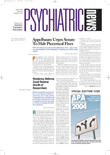While closer than ever to being able to meet the complex mental health care needs of their patients, today’s psychiatrists are often stymied by a system that is riddled with problems and short on funds, APA President Marcia Goin, M.D., emphasized at the Opening Session of APA’s 55th Institute on Psychiatric Services in Boston in October.
“We are hampered in our ability to make use of today’s knowledge by the tragic situation that exists in terms of patients’ access to care,” Goin told attendees, evoking the theme of this year’s meeting, “Access to Integrated Mental Health Care.”
Goin said many of these problems were highlighted in the July 2003 report of the President’s New Freedom Commission on Mental Health. They include stigma surrounding mental illness, discrimination in insurance coverage for mental health care, and inadequate and fragmented mental health services (Psychiatric News, August 15).
The commission report and an October report issued by Human Rights Watch (see
page 5) also recognize “the distressing role handed by default to our criminal justice system,” Goin said, and have brought national attention to the fact that “the number of people with mental illness in the nation’s prisons and jails far outnumbers the number of mentally ill in our psychiatric hospitals.”
A more comprehensive mental health system can be established with legislatively mandated mental health parity, closer coordination between mental health and primary care, accessibility and affordability of mental health services, and support for evidence-based practices, Goin said.
The mental health commission recommended in its report that treatments should help patients to “successfully cope with life’s challenges by facilitating recovery and building resilience—not just managing symptoms,” Goin noted. This advice resonates with APA’s “Vision for the Mental Health System,” which, she said, should be “community-based, culturally sensitive, and easily accessible.”
However, conspicuously absent from the commission’s report is the need for increased funding for mental health services, Goin pointed out, which “is absolutely critical if these changes are to be implemented successfully.”
She praised the success of a California law known as AB 34, which funds mental health services for homeless people in the state and is one of the model programs listed in the commission’s report.
The three-year-old initiative began with three pilot programs and has since spawned programs in 38 counties.
Data from the AB 34 pilot programs show that it brought about a 66 percent decrease in psychiatric hospitalization days, an 82 percent decrease in days of incarceration, and 80 percent fewer days of homelessness.
“The program, which is relatively small, reaches about 5,200 of the state’s 50,000 homeless people with severe mental illness,” Goin noted.
It also costs money—$54.9 million a year, to be exact.
“The government must accept the fact that there is no short, easy, dollarless way to change this situation,” she said, referring to the mental health crisis in America. “Psychiatric illness is a physical illness, and treatment a basic public health need.” ▪

